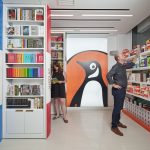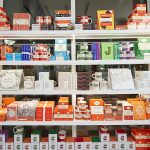Penguin Random House is doing a lot more than selling books and tote bags at its first retail location—a 158-sq.-ft. shop that opened in the lobby of the office tower that houses its Toronto headquarters. The book publisher is using the Penguin Shop as a product lab and a way to gather consumer insights.
Like other publishers, Penguin Random House has not traditionally had direct access to consumers. “It’s very much in the parlance of the book industry at the moment to hear publishers talking about the need to get closer to consumers,” said Robert Wheaton, chief operating officer at Penguin Random House Canada.
“Often that means having active online presences and going back and forth on Twitter, and of course, we do all that stuff too. But, given that so much of our business is in partnership with booksellers, the idea of having staff talk to readers and help guide them on their recommendations… there’s no more invaluable set of insights than actually talking to readers on the ground.”
Meghan MacDonald, director, digital product strategy and consumer marketing development, added that Penguin Random House is taking a multi-pronged approach to consumer insights.
“We’re thinking about things like website personalization and newsletter subscriptions, and taking an omni-channel retail approach,” she said. “We really see the Penguin Shop as part of that. You come into the shop, you can sign up for a newsletter. Maybe down the road we’ll have a loyalty program—things that we can test out within the space and then potentially roll out to our wider company.”
The shop will also serve as an R&D lab for its new branded products, which include Penguin Classics mugs, notebooks, tote bags and enamel pins.
“We feel like we can have a healthy set of conversations in our office informed by what’s happening downstairs that could lead to things we could take to other partners, whether that’s clothing or prints,” said Wheaton.
For example, characters in children’s picture books could be extended to plush toys or having prints on baby clothing.
Wheaton said Penguin Random House wasn’t planning on opening any more retail locations. “At this moment, it’s a ‘let’s see what we can learn from consumers and readers,’” he said. “I think it’s fair to say that the experience of coming up with a unique retail experience in 158 square feet of an office tower has been a challenge rewarded by the particular constraints that it has.”
The Penguin Shop was designed by Toronto-based Figure3. Vice-president Marjorie Mackenzie said despite its tiny size, the retail space managed to incorporate Figure3’s seven principles of retail design, which include things such as being open and social, engaging and constantly evolving.
The shop features bookshelves that slide out of the wall and are capped with floor-to-ceiling book spines. The spines are magnetic and can be interchanged for different events or promotions. For example, if Penguin Random House is celebrating author Margaret Atwood, all the spines can be books she has written.
Mackenzie noted the lobby of the building was quite dark, so a huge backlit wall draws the attention of people walking by. “It’s sort of like a beacon within that space,” she said.
The space was also designed to be “Instagrammable” to generate word of mouth, said Penguin Random House’s MacDonald.
The company is treating the opening as a soft launch and has been doing promoted tweets and advertising on Facebook and Instagram. MacDonald said the company would do more marketing in the fall, as it heads into the holiday gift-buying season.
Though nothing is set in stone yet, “we like the idea of being more non-traditional when it comes to marketing,” said MacDonald. “We’re thinking about ways we can let consumers discover and be surprised with something they find that leads them to the shop.” For example, chalk artists could create works on Toronto sidewalks or custom, collectible posters could be hidden around the city.













